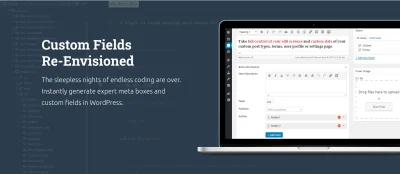Meta Box vs Pods: In-Depth Comparison in 2024

Key Points at a Glance
- Origins and Maintainers: Meta Box emerged in 2010 and is managed by the eLightUp agency, while Pods, established in 2008, is a community-supported project with Scott Kingsley Clark as a key contributor.
- Business Models: Meta Box offers both a free plugin and paid add-ons for enhanced features, while Pods remains entirely free, relying on community donations for support.
- Features Comparison: Both Meta Box and Pods provide intuitive interfaces for managing CPTs and Taxonomies, but Meta Box offers more field types and conditional field logic as paid add-ons.
- Pricing: Meta Box offers various pricing tiers, including a lifetime option, while Pods is completely free for all users.
- User Profiles and Taxonomies: Both plugins offer the ability to add custom fields to user profiles and taxonomies, with Meta Box offering these features through paid add-ons.
- Repeater Field and Table Storage: Both plugins offer repeater field functionality, with Meta Box providing it as a paid add-on, while Pods includes it for free. Pods also offers table storage for optimizing data retrieval and performance.
- Display Options: Advanced Views integration allows both plugins to display field values on the frontend efficiently, while also supporting code functions, shortcodes, and page builder integrations.
- Support and Documentation: Meta Box provides comprehensive documentation and personalized support for paid users, while Pods relies on community support and basic documentation.
Table of Contents
If you're in search of a meta fields plugin or exploring alternatives to your current one, this article will introduce you to two of the most popular and widely recognized plugins for managing Custom Post Types (CPTs) and meta fields: Meta Box and Pods.
If you're familiar with any of the plugins mentioned above, you're likely aware that they not only enable you to incorporate custom fields into your pages, posts, and CPTs but also provide intuitive interfaces for creating Custom Post Types and Taxonomies. Additionally, they offer features such as custom option pages and custom Gutenberg blocks.
We've handpicked these top two plugins and will compare their key aspects, empowering you to select the one that aligns best with your requirements.
Tip: It's a one-to-one comparison. If you're interested in reviewing the top three plugins for meta fields all at once in a table format, you can find them in this article.
1. Maintainers and business models
As we endeavor to delve deeper into the realm of meta-field plugins for WordPress, it's crucial to understand the foundations and structures of the leading players in this arena. Let's embark on a journey to unravel the backstory and business models behind it.
Origins and maintainers
Meta Box
Meta Box emerged in 2010, showcasing a notable legacy in the domain of WordPress meta field management. Meta Box stands as the second most popular plugin for managing meta fields. The plugin is nurtured and managed by the committed team at eLightUp agency, guaranteeing its continual evolution and assistance for users.
Pods
Pods is a trailblazer among meta field plugins, making its debut in 2008. Since its inception to the present day, it has upheld its status as a fully open-source project, sustained entirely by the community, which has even established a Pods foundation. One of the most dedicated contributors over the years has been Scott Kingsley Clark, who continues to spearhead plugin development and support.
Business models
Meta Box
Meta Box provides a free plugin, equipping users with a fundamental toolkit for managing meta fields. However, what sets Meta Box apart from Pods is its offering of paid add-ons. Instead of consolidating all premium features into a single package, Meta Box permits users to choose and acquire specific add-ons according to their needs. This modular approach offers enhanced flexibility and cost-effectiveness, enabling users to customize their experience to meet their individual requirements.
Pods
As previously mentioned, Pods is a fully free plugin sustained by the community, ensuring that all features are available to everyone without charge. However, continuous development of new features and upkeep demands considerable time, and the financial aspect plays a crucial role in either advancing or hindering the plugin's progression. Contributors to Pods rely on donations from individuals and companies that utilize Pods on their websites and aspire for the plugin's success.
2. Features comparison
CPT and Taxonomy Management
While WordPress does offer the functionality to create Custom Post Types (CPTs) and Taxonomies by default, it lacks a user-friendly interface for this task. The plugins under review aim to bridge this gap by providing intuitive tools for managing CPTs and Taxonomies.
Meta Box

Meta Box offers CPT and Taxonomy management capabilities through its free add-on. Employing a traditional approach, Meta Box presents a familiar interface for defining and organizing CPTs and Taxonomies.
Pods
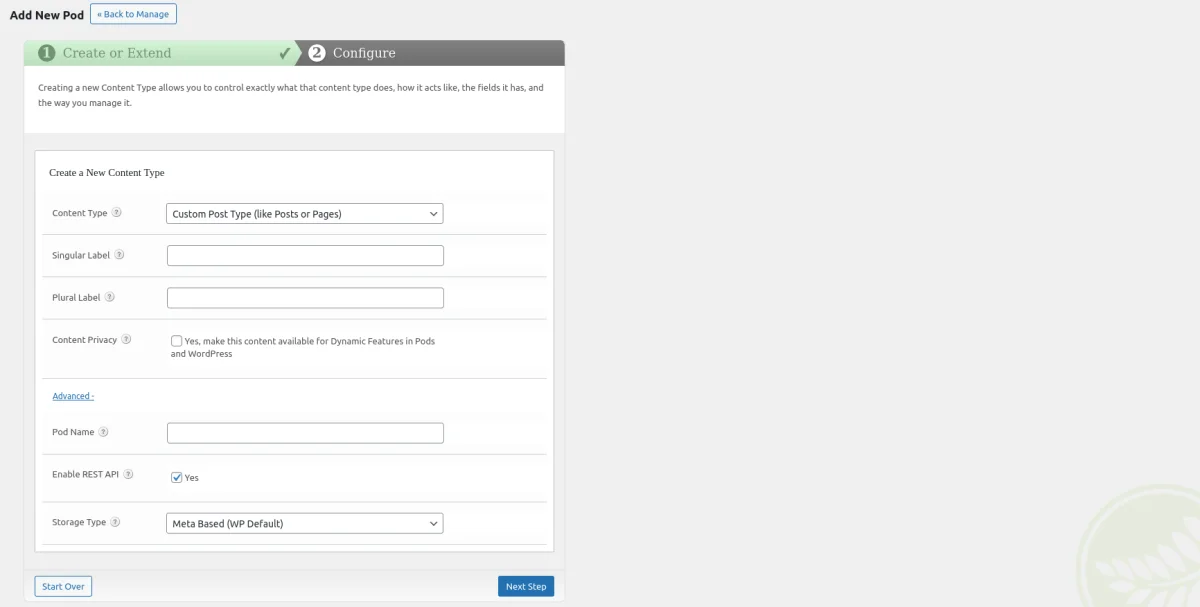
The Pods plugin also includes CPT and Taxonomy management features. Alongside the conventional settings, it incorporates a built-in table option for meta storage. This feature is essential for websites experiencing high visitor traffic and performance considerations. Notably, Pods is the only plugin offering this feature free of charge. We will explore this feature in detail later on.
Both plugins provide CPT and Taxonomy management functionalities at no cost, following a similar methodology. They utilize tab-based UI designs to enhance user experience, ensuring a smooth and intuitive process for configuring and managing CPTs and Taxonomies.
Number of field types
In the domain of meta fields, the diversity of available field types plays a crucial role. It allows us to precisely define the appearance, data format, and behavior of fields.
Meta Box
Note: Unlike Pods, Meta Box does not offer a built-in UI for field creation. Users who prefer not to use code can either utilize the free online official field configuration generator or opt to purchase an add-on that provides a UI for field creation.
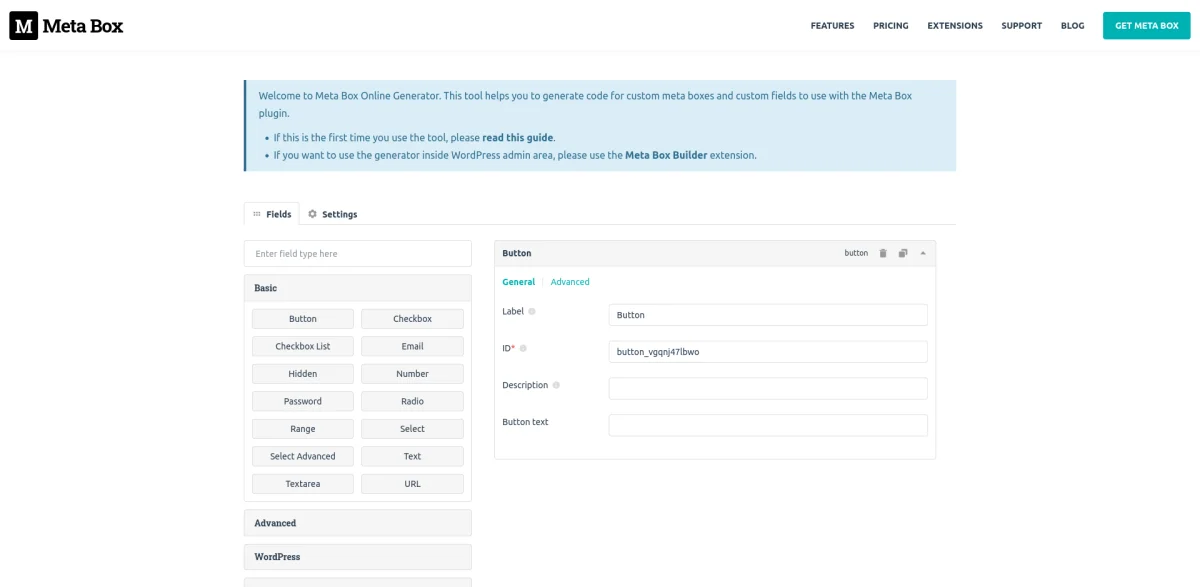
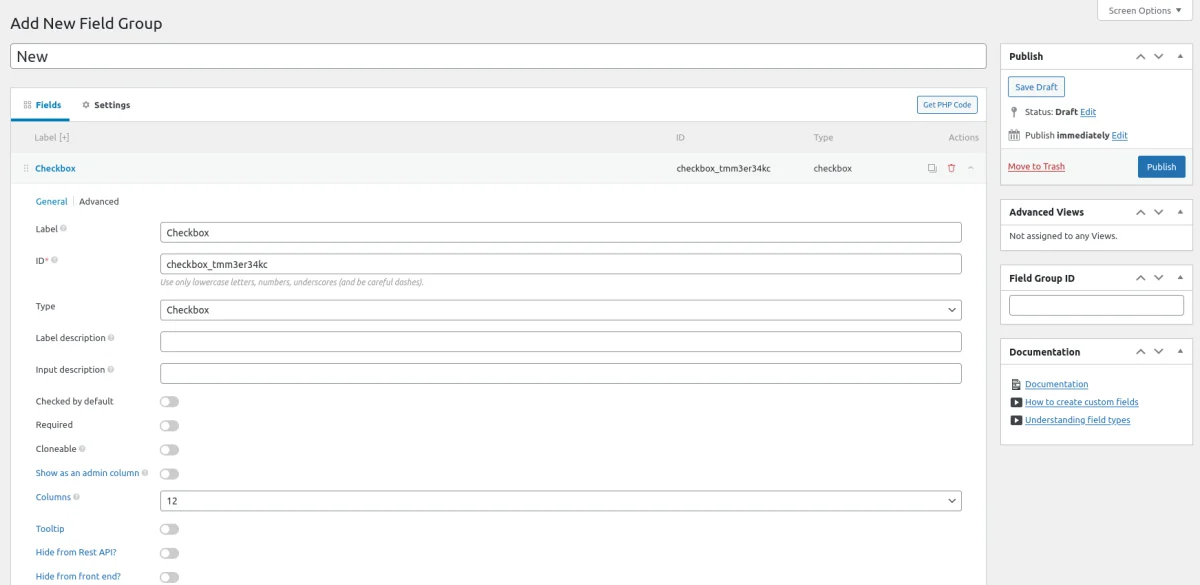
The Meta Box plugin boasts 50 free field types and 1 paid option.
Pods
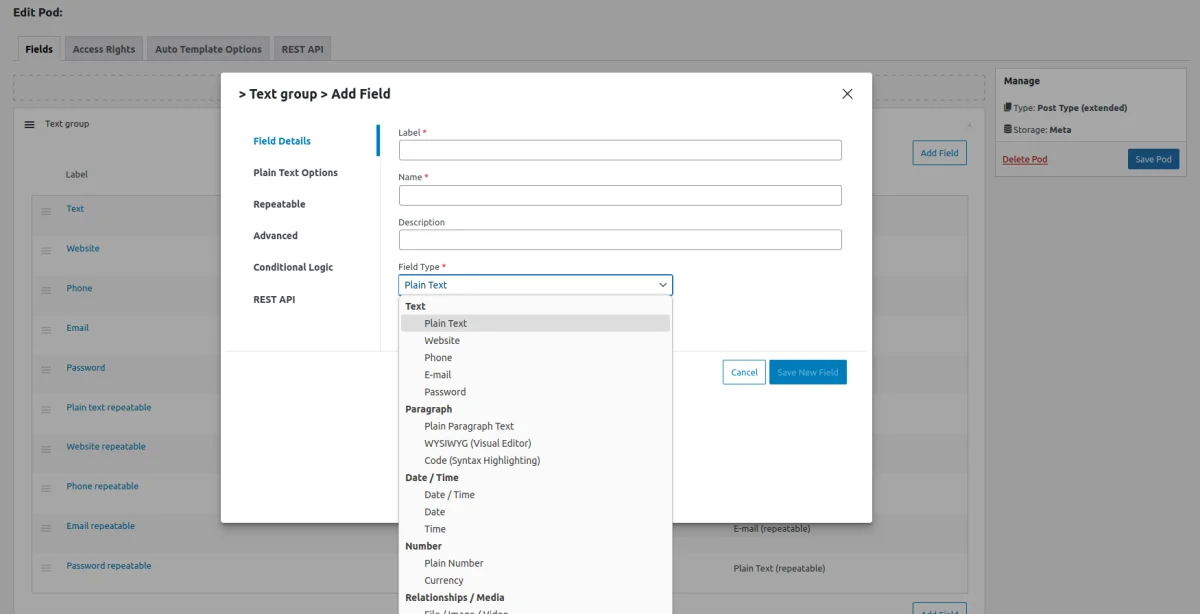
Pods offers 25 input types, all free of charge.
While it may appear that Meta Box offers a wider range of field types compared to Pods, the distinction is not as clear-cut in practice. It reflects a different approach to field types.
For instance, Pods may provide a single field type for a select field, regardless of the type (post list, users, custom, etc.), whereas Meta Box offers distinct field types for each, providing unique appearances and behaviors for editors. Thus, when considering the number of unique data types, both plugins are relatively similar.
The advantage of Meta Box lies in its ability to offer various field types for the same data type, granting users finer control over the appearance of fields for administrators. However, this can also introduce more decision-making during the field creation process, particularly for users new to Meta Box.
In terms of advanced field settings, both plugins offer the 'repeatable' setting for free. Additionally, the Meta Box Group field, which, when combined with the repeatable setting, functions similarly to a repeater field, is available as a paid add-on.
Conditional field logic
Another crucial feature that enhances the functionality of meta fields is conditional field logic. This functionality empowers us to control the display of fields based on specific conditions, offering greater flexibility and customization options. With conditional field logic, we can associate field groups with particular pages or conditions, rather than applying them universally across all content.
Moreover, conditional field logic allows us to manage field visibility within the group itself. For example, we can include a 'type' selection field and exhibit different sets of fields based on the selected value.
Note: It's essential to clarify that conditional field logic primarily influences the appearance and behavior of fields within the editor screens of WordPress, rather than affecting how fields appear on the frontend of the website.
Meta Box

Conditional logic is available in Meta Box as a paid add-on, providing users with the flexibility to integrate advanced field visibility rules and conditions into their WordPress projects.
Pods
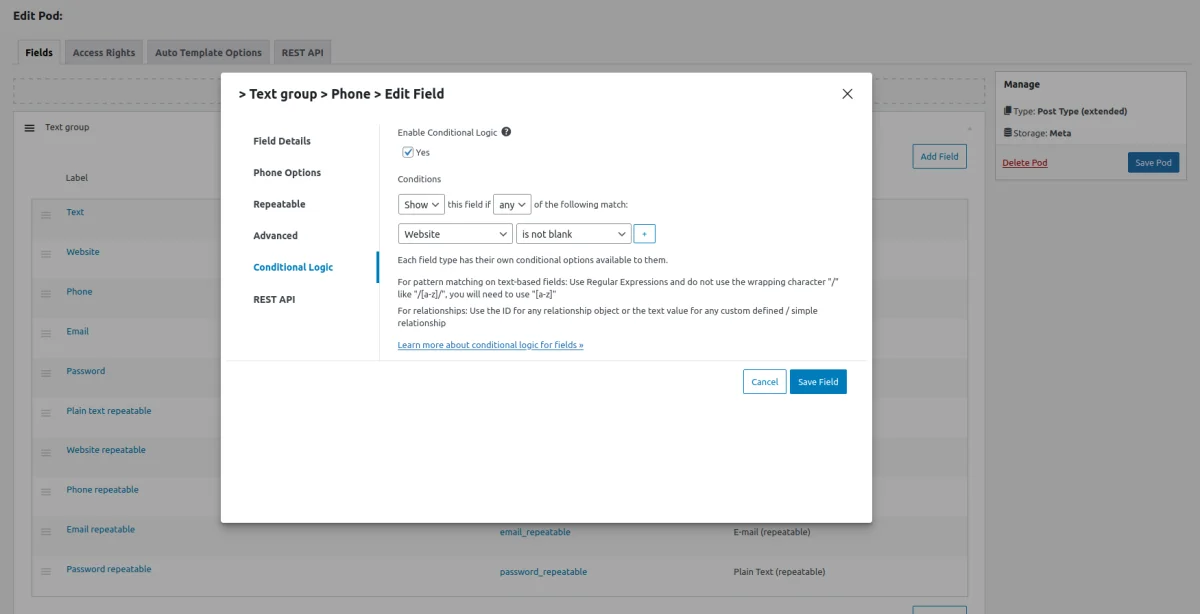
Conditional logic in Pods is available, but it's limited to individual fields. While you can control the appearance logic of individual fields, you cannot apply the same logic to the entire group.
This limitation may not be problematic when dealing with Custom Post Types (CPTs), as all items within a CPT usually share the same set of fields. However, if you plan to add fields to Pages, this limitation may be a drawback, as all pages will have the same sets of fields.
Options pages
Options pages provide another valuable feature, simplifying the creation of custom settings pages within WordPress. This functionality becomes incredibly useful when integrating global site settings or theme-specific customizations.
While it's possible to achieve this without plugins, utilizing dedicated tools streamlines the process by providing a user-friendly UI. With these plugins, you can easily define the page name, generate fields, and associate them with the options page. The plugins take care of all other aspects, including page display, rendering, validation, and field saving.
Meta Box
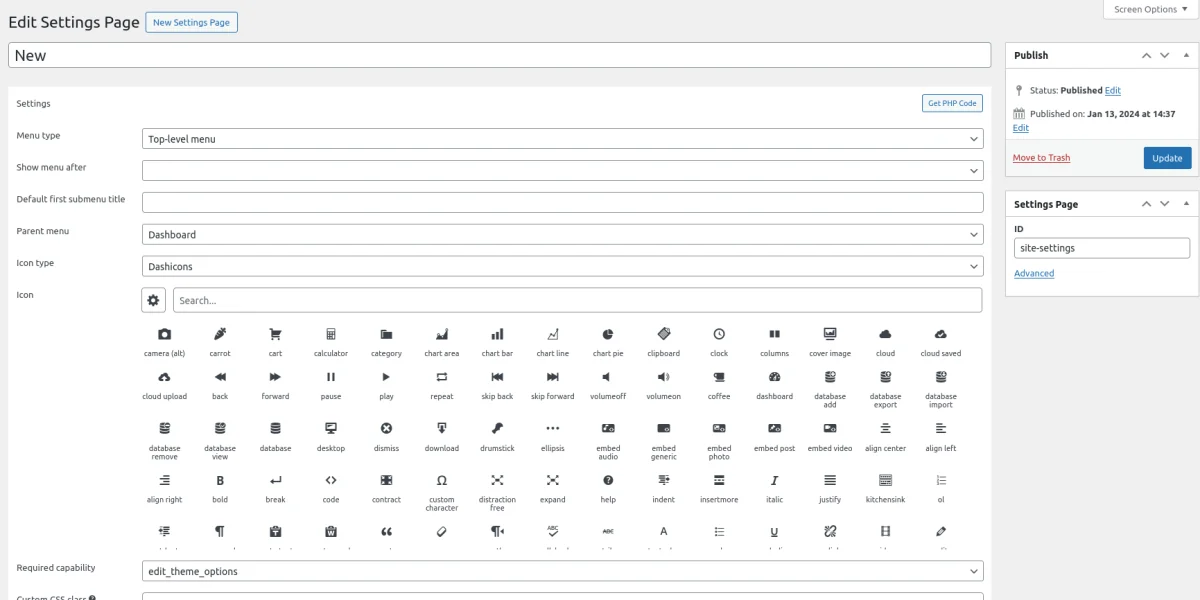
Meta Box users can access the options page feature through a paid add-on. This addon expands the functionalities of Meta Box, enabling users to develop comprehensive options pages customized to their specific needs and preferences.
Pods
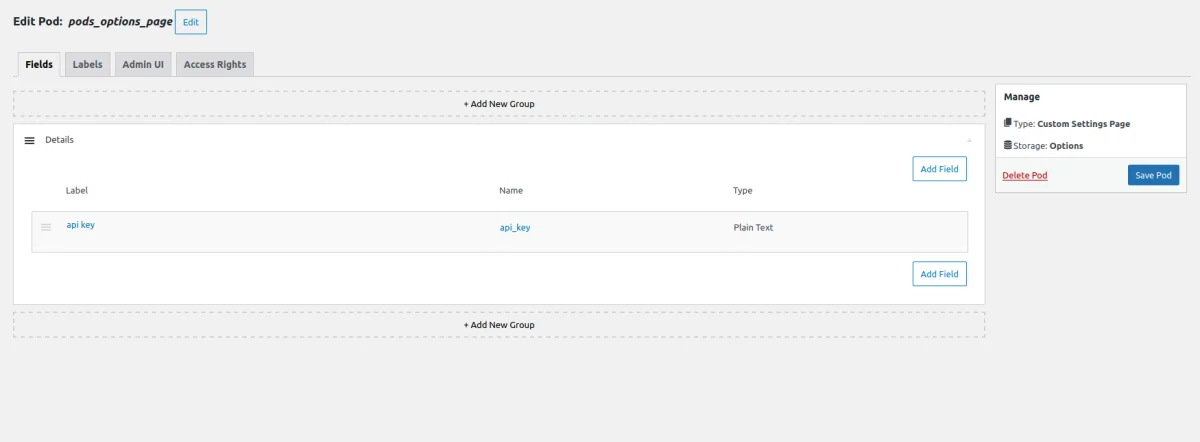
Pods also provides the options page feature, and its settings are handled using the same user interface as other elements.
Apart from the standard set of settings, both Meta Box and Pods offer the flexibility to select the location, allowing you to position it as a submenu item (e.g., under the Settings item) or as a standalone item.
User and Taxonomy meta
While it's evident that meta vendor plugins enable us to add meta fields to pages, posts, or Custom Post Types, what about other WordPress entities? There's often a need to introduce custom settings to Taxonomies or User profiles. These entities utilize distinct database tables compared to pages/posts, making the capability to manage meta fields for them a separate feature.
Meta Box
In Meta Box, the ability to manage user and term metadata is accessible through paid add-ons. These add-ons expand the capabilities of Meta Box, allowing users to seamlessly integrate custom meta fields into User profiles and Taxonomies.
Pods
The Pods plugin also enables us to add custom fields to User and Taxonomy objects.
Custom Gutenberg blocks
The ability to create custom Gutenberg blocks is undoubtedly a game-changing feature. While the Gutenberg editor enhances flexibility, it lacks a comprehensive PHP API for seamlessly creating blocks with fields.
With this functionality, you can easily design your own Gutenberg blocks and leverage a diverse range of available field types to configure custom settings for the block. These plugins handle the task of adding the block and rendering, freeing you to focus on the block's visual presentation.
Meta Box
For Meta Box users, the MB Blocks feature is accessible through a paid add-on. This addon expands the capabilities of Meta Box, allowing users to develop custom Gutenberg blocks customized to their specific requirements and preferences.
Pods
The Pods plugin offers the Pods Blocks API, facilitating the seamless creation of Gutenberg blocks with custom templates. It allows users to attach basic custom fields, such as text or select, as its settings.
Repeater field
It's essential to emphasize the importance of the repeater field type and the repeatable option, as these are fundamental aspects that you'll frequently encounter. The repeater field type allows you to include multiple meta fields within a single row or instance, enabling editors to replicate this row multiple times.
On the other hand, the repeatable option enables editors to duplicate a single field multiple times. While both features facilitate field repetition, the repeatable option is limited to a single field, whereas the repeater field can accommodate any number of fields within each repeated instance.
Meta Box

While Meta Box does not feature a field named 'repeater,' it provides a paid add-on that introduces a 'group' field with the repeatable feature. This functionality operates similarly to the repeater field, enabling users to create repeating groups of fields within their WordPress projects.
Pods
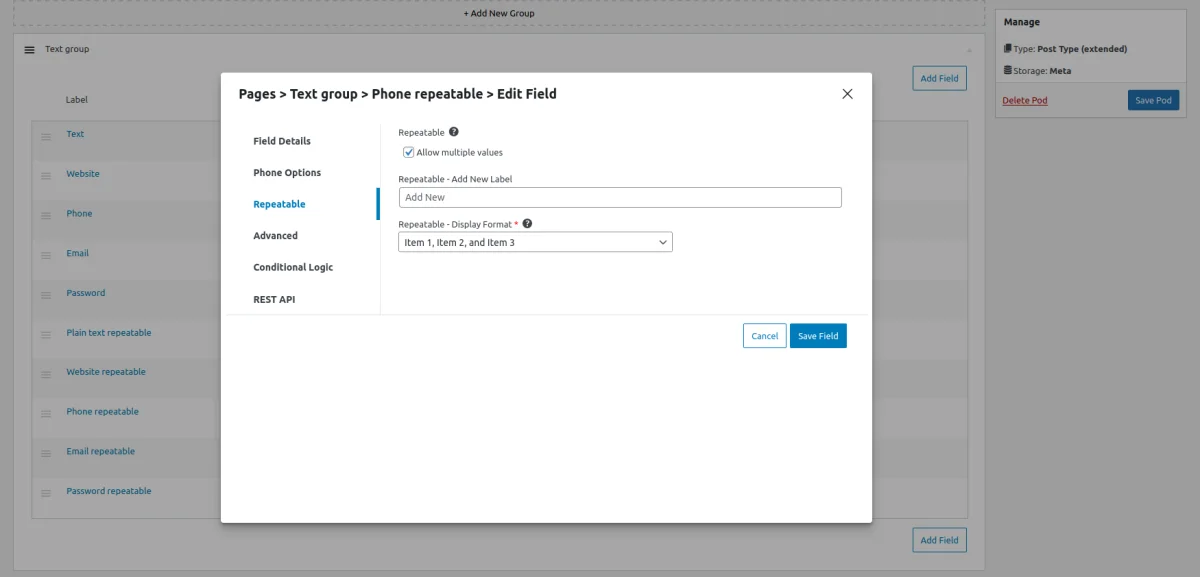
Pods provides the repeatable setting for free. As previously mentioned, it's limited to a single field only, so users won't be able to make a set of fields repeatable, which is necessary in some cases.
Table storage
Storing custom data in metafields is a common practice in WordPress. It's simple and allows for data querying from the same table. However, like many solutions, it has its drawbacks. If your project heavily relies on meta fields, especially with numerous custom fields or complex types like repeaters, it can potentially lead to performance issues.
We're not just talking about adding a few or even ten fields to your page; in such cases, the performance difference is hardly noticeable. The concern arises when dealing with a significant number of custom fields, which is quite common, especially when working with Custom Post Types.
The problem lies in the storage type of these meta fields, which are stored in the universal wp_postmeta table. This table isn't specifically optimized for your specific set of fields, resulting in potential inefficiencies in data retrieval and processing. However, should we abandon the convenience and features that metafields offer in data-intensive projects?
Fortunately, there is a solution known as 'table storage.' The primary concept behind this feature is to replace the default wp_postmeta storage with custom tables, where each Field group has its dedicated table. This approach optimizes data storage and retrieval, enhancing performance and scalability for projects with extensive metafield usage. Importantly, there are no changes during the field creation process or in how they appear to editors; all the optimization occurs seamlessly in the background when you save or load the page.
Meta Box
Meta Box offers a dedicated paid addon for table storage, allowing users to optimize data storage and retrieval for their projects with ease and efficiency.
Pods
Pods includes the table storage option for any content type right out-of-the-box.
3. Pricing
Meta Box offers six tiers, including a lifetime option, while Pods is available for free for everyone.
| Plugin | 1 year for 1 website | 1 year for unlimited websites | Lifetime |
|---|---|---|---|
| Meta Box | 49$ (includes some addons only) | 149$ with some add-ons 229$ with all add-ons | 299$ for 3 websites 699$ for unlimited |
| Pods | completely free | completely free | completely free |
4. Docs, Support and Community
In this comparison, we'll assess aspects related to 'support.' It's crucial to recognize that documentation and a vibrant community are as important as individual support. Extensive documentation and a large community can offer a treasure trove of pre-existing answers to the questions you may encounter.
Meta Box
Meta Box boasts over 700,000 active installations, comprehensive documentation, and provides support for the Basic plugin through the forum. Additionally, Pro users benefit from personalized support, ensuring dedicated assistance tailored to their requirements.
Pods
Pods boasts over 100,000 active installations. It's essential to note that Pods is supported by the community, so it provides only basic primary documentation. The community engages through the wp.org forum and a Slack channel, where users assist each other.
As Pods lacks a Pro version, direct support via email, as available with paid Meta Box addons is not provided. Hence, it's crucial to consider the significance of personalized support for your specific project when selecting the appropriate meta plugin.
5. Display options
We've explored the features of these plugins, and now let's dive into how field values can be showcased on the front end of your website.
Initially, these plugins served as wrappers over WordPress's native meta feature, providing code functions that encapsulated the WP get_post_meta() function. While this method allowed for full control over the layout, it was also time-consuming, requiring manual effort.
Over time, alternative methods emerged, each with its own set of advantages and disadvantages. Additionally, with the increasing popularity of page builders, integrations for meta vendors have become more prevalent.
Furthermore, it's worth mentioning Advanced Views, a plugin that introduces smart templates, offering a modern and efficient approach to displaying your content, including meta fields.
According to the plugin's documentation, Advanced Views is a versatile and flexible tool that sets itself apart from drag-and-drop builders. It can be used independently or in conjunction with your preferred framework or builder.
| Plugin | Supported by Advanced Views | Code function | Shortcode | Other ways |
|---|---|---|---|---|
| Meta Box | yes (all the meta field types) | rwmb_get_value() | for single field | MB Views Page builder integrations |
| Pods | yes (all the meta field types) | pods()->field() | for single or multiple fields | Pods templates Blocks Page builder integrations |
6. Summary
In this article, we've explored two prominent contenders - Meta Box and Pods - each with a rich history and distinct strengths. Your choice between them should be informed by which one best fits your specific needs.
To illustrate, let's draw parallels with desktop operating systems (OS).
Pods
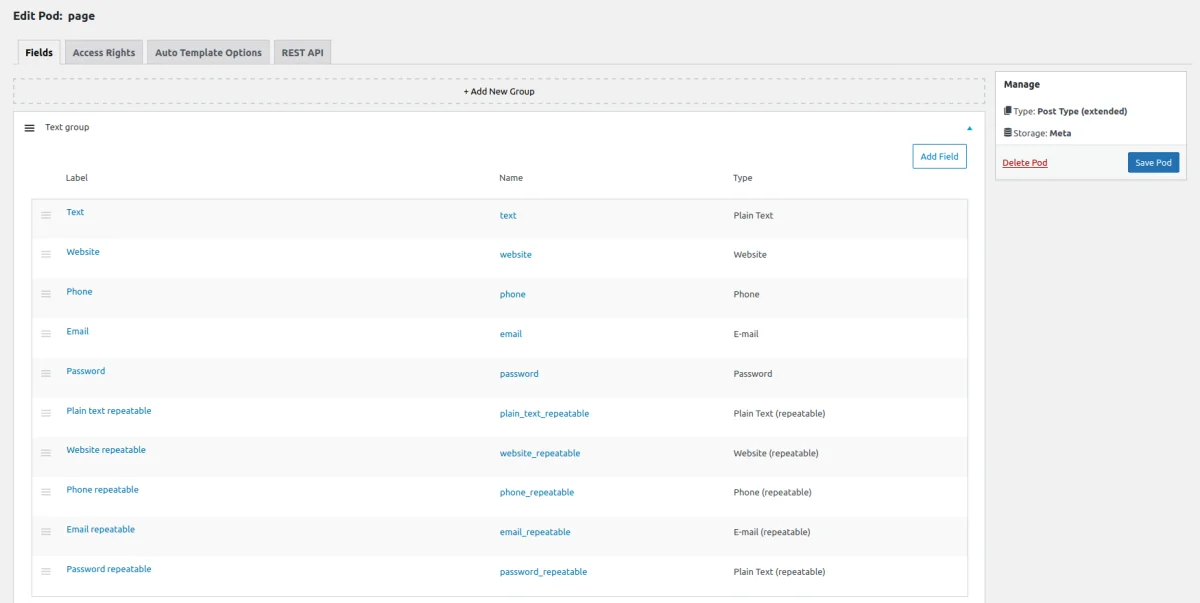
Pods can be compared to Linux, providing comprehensive functionality at no cost. It offers all essential features with extensive settings for customization, though it requires users to have some foundational knowledge to navigate its features. Additionally, users may need time to become familiar with its settings, as the documentation is relatively basic.
Meta Box
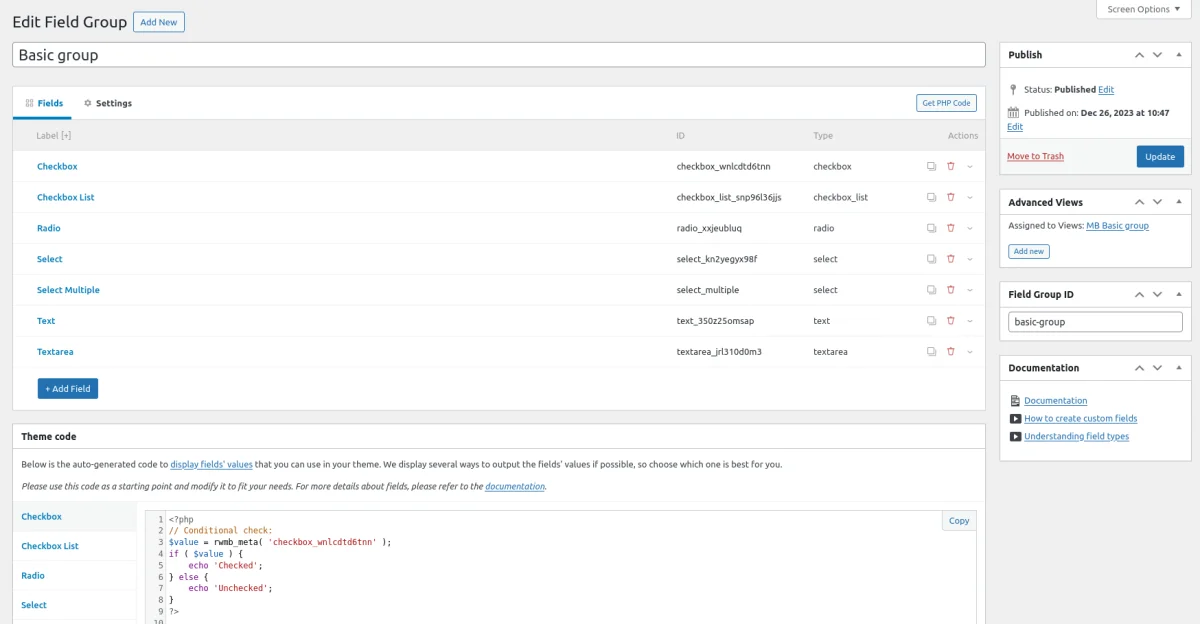
Meta Box is an ideal choice for developers proficient in coding who appreciate its rich selection of APIs and extensive customization options. With a diverse array of over 50 field types, users have the flexibility to fine-tune the appearance and behavior of fields for editors.
As a premium offering, Meta Box offers comprehensive documentation. However, users should be aware that additional features and personalized support come with a price tag. For instance, if you prefer a graphical user interface (GUI) for field creation, you'll need to either use the official online configurator or invest in purchasing an add-on.
Afterwords
We hope this article has provided valuable insights for you. Please don't hesitate to share your thoughts or ask any questions in the comments section below. Happy developing!
Thank you for reading! to our monthly newsletter to stay updated on the latest WordPress news and useful tips.

Stuck with development or facing an issue?
WPLake offers affordable on-demand website development and design.
No matter the size of your project - contact us now, and we'll get it done for you!
Frequently Asked Questions Test Your Knowledge
FAQ mode
/
Learning mode
- How do Meta Box and Pods differ in their business models?
Meta Box offers both a free plugin and paid add-ons for additional features, while Pods remains entirely free, relying on community donations for support.
- Can Meta Box and Pods add custom fields to user profiles and taxonomies?
Yes, both plugins offer the ability to add custom fields to user profiles and taxonomies, with Meta Box offering these features through paid add-ons.
- What is the difference between repeater field functionality in Meta Box and Pods?
Pods offers only a "Repeatable" option, allowing duplication of a single field, while Meta Box provides a fully-featured repeater functionality. However, Meta Box's repeater functionality is available as a paid add-on.
Content links (50)
32.
docs.metabox.io34.
docs.metabox.io